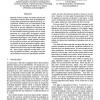Free Online Productivity Tools
i2Speak
i2Symbol
i2OCR
iTex2Img
iWeb2Print
iWeb2Shot
i2Type
iPdf2Split
iPdf2Merge
i2Bopomofo
i2Arabic
i2Style
i2Image
i2PDF
iLatex2Rtf
Sci2ools
130
Voted
IJCAI
2003
2003
When Discriminative Learning of Bayesian Network Parameters Is Easy
Bayesian network models are widely used for discriminative prediction tasks such as classification. Usually their parameters are determined using 'unsupervised' methods such as maximization of the joint likelihood. The reason is often that it is unclear how to find the parameters maximizing the conditional (supervised) likelihood. We show how the discriminative learning problem can be solved efficiently for a large class of Bayesian network models, including the Naive Bayes (NB) and treeaugmented Naive Bayes (TAN) models. We do this by showing that under a certain general condition on the network structure, the discriminative learning problem is exactly equivalent to logistic regression with unconstrained convex parameter spaces. Hitherto this was known only for Naive Bayes models. Since logistic regression models have a concave log-likelihood surface, the global maximum can be easily found by local optimization methods.
Related Content
| Added | 31 Oct 2010 |
| Updated | 31 Oct 2010 |
| Type | Conference |
| Year | 2003 |
| Where | IJCAI |
| Authors | Hannes Wettig, Peter Grünwald, Teemu Roos, Petri Myllymäki, Henry Tirri |
Comments (0)

